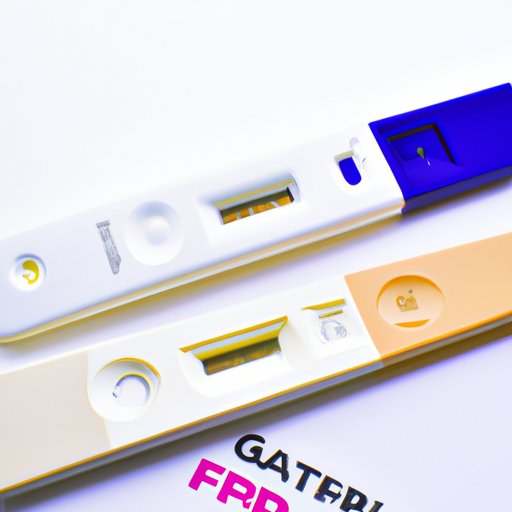Introduction
For those who are trying to conceive or suspect that they may be pregnant, taking a pregnancy test can be an anxiety-filled experience. It’s natural to have questions about when is the best time to take a pregnancy test and what hormones are involved in determining a positive result. This article will explore the different types of pregnancy tests available, understanding hormone levels, common questions about taking a pregnancy test, analyzing the pros and cons of taking a home pregnancy test, and debunking myths about pregnancy tests.
Understanding Hormone Levels and When is the Best Time to Take a Pregnancy Test
When it comes to determining when is the best time to take a pregnancy test, it’s important to understand the role that hormones play in the process. Home pregnancy tests measure the amount of human chorionic gonadotropin (hCG) in a woman’s urine. hCG is a hormone produced by the placenta shortly after a fertilized egg attaches to the uterine wall.
The amount of hCG in a woman’s body increases as her pregnancy progresses. While the levels of hCG vary from woman to woman, most tests can detect hCG levels as low as 20 mIU/ml, which is typically present about 10 days after conception.

Common Questions About Taking a Pregnancy Test: What You Should Know
When taking a pregnancy test, there are several common questions that come up. How early can a pregnancy test detect hormones? What if you take a pregnancy test too early? What other factors should you consider before taking a pregnancy test? Let’s look at each of these questions in more detail.
How Early Can a Pregnancy Test Detect Hormones?
Most home pregnancy tests can detect hCG levels as low as 20 mIU/ml. This means that the test can detect pregnancy as early as 10 days after conception. However, it’s important to remember that the earlier you take a pregnancy test, the less accurate it is likely to be. If you take a test too early, you may get a false negative result, meaning that the test says you are not pregnant when you actually are.
What If I Take a Pregnancy Test Too Early?
If you take a pregnancy test too early, you may get a false negative result. This means that the test says you are not pregnant when you actually are. In this case, you should wait a few days and take another test. It’s also important to keep in mind that the accuracy of the test depends on the brand and type of test you use.
What Other Factors Should I Consider Before Taking a Pregnancy Test?
Before taking a pregnancy test, it’s important to consider other factors such as how long it has been since your last menstrual period, any medications you are taking, and whether or not you are experiencing any signs or symptoms of pregnancy. Additionally, it’s important to read the instructions carefully before using the test, as different tests may require different steps.

Analyzing the Pros and Cons of Taking a Home Pregnancy Test
Home pregnancy tests are a convenient and cost-effective way to determine if you are pregnant. Here are some of the pros and cons of taking a home pregnancy test:
Pros of Taking a Home Pregnancy Test
- Convenient – most tests can be taken at home without the need to visit a doctor.
- Cost-effective – tests are generally inexpensive compared to a visit to the doctor.
- Discreet – most tests can be done in private without anyone else knowing.
- Accurate – most tests are fairly accurate when used correctly.
Cons of Taking a Home Pregnancy Test
- False results – due to incorrect usage or testing too early, a false result can occur.
- Uncertainty – even if the result is positive, it is still possible for it to be wrong.
- Stressful – the anticipation of waiting for results can be stressful.
Debunking Myths About Pregnancy Tests: When is the Right Time?
There are many myths surrounding pregnancy tests, so it’s important to know the facts. Here are some common myths and the truth behind them:
Are There Any Risks Involved with Taking a Pregnancy Test?
No, there are no risks involved with taking a pregnancy test. Home pregnancy tests are safe and reliable when used correctly.
Is It Possible to Take a Pregnancy Test Too Late?
No, it is not possible to take a pregnancy test too late. The accuracy of the test does not change regardless of when it is taken.
Conclusion
In conclusion, taking a pregnancy test can be a nerve-wracking experience for many. Understanding hormone levels and when is the best time to take a pregnancy test is key to ensuring an accurate result. Common questions about taking a pregnancy test, such as how early can a pregnancy test detect hormones and what if you take a pregnancy test too early, should be considered before taking a test. Analyzing the pros and cons of taking a home pregnancy test can help you make an informed decision. Finally, debunking myths about pregnancy tests can help ensure that you are making the best decision for your health and wellbeing.
The best time to take a pregnancy test is when your period is late or when you are experiencing any signs or symptoms of pregnancy. Tests are generally most accurate when taken at least 10 days after conception. Remember to read the instructions carefully before using the test, as different tests may require different steps. And finally, make sure to follow up with your doctor if you get a positive result.


